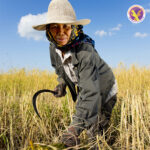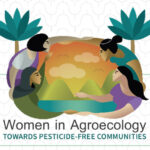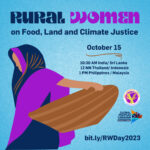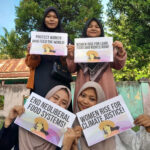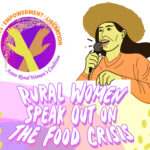TNWF Organised Seminar on Rice / Food Crisis and Livelihood
The Tamil Nadu Women’s Forum (TNWF) organised a seminar on “Rice/Food Crisis and Livelihood” in continued observance of the Year of Rice Action (YORA). The event was held on 18 June 2009 at Kadambanallur, Arakkonam Taluk, Vellore District. Around 100 participants which included farmers, women, agricultural wage labourers, engineers, students, representatives from the Agricultural Department and members of people’s movements benefited from the seminar.
Important highlights of the seminar included:
- The seminar was led by farmers and for farmers in, an organic farming area of 20 acres;
- Many farmers who are practicing organic farming participated;
- Farmers shared their experiences, grief, suggestions and raised questions which led to an interactive discussion;
- Organic herbicides / pesticides, traditional seeds and fertilizers were displayed and demonstrated and;
- Different varieties of rice, seeds, dry chilies, brinjals, organic fertilizers and organic pesticides from the organic farms were sold at the venue, promoting a direct market.
Knowledge gained through the seminar included:
- Every farmer should have a well-balanced biodiverse farm (e.g. Animals, trees to continue the cycle, etc.);
- Farmers should plant milk-producing trees (eg. Jackfruit) as they bring more rainfall;
- Water storage methods should be promoted;
- Water from tender coconuts should be used as fertilizer as they are rich in potash and;
- In ancient days, single rice cropping system has been used in Tamil Nadu and has been recorded in Tamil Literature in the year 1908 and 1911.
Ms. Vimala, TNWF coordinator welcomed the gathering and, introduced YORA and its importance in protecting our rice and livelihood. Mr. Neela Sampath, leader of the Thakolam organic farmers union led the seminar. He mentioned that students from the age of 15 should be made aware about organic farming that would help to continue the struggle against food crisis. He recommended small dams to be built near agricultural areas which would sustain farmers and their lands.
TNWF’s Ms. Fatima Burnad said, “Those who are landless should get lands and those with lands should not loose their lands”, which brought out the identities of castes and globalization. She was persistent to conduct a protest action against the Seed Act which requires farmers with traditional seeds to be registered with the Department and if not, the farmers would be punished. She insisted that enough subsidies from the government should be given to small farmers; farms allotted for food should not be used for agro-fuel; women should be trained to make organic manure at homes and should sell it to the farmers directly, promoting self employment.
An organic farmer and a Law graduate, Mr. Mani, stressed that rice should be protected and its production should be increased, which allows no imports. He explained how weeds could become manure with the help of small machine and without plucking them out. Another organic farmer Ms. Poongodi, shared that she has her own kitchen garden. She said that if a child becomes sick, we would provide treatment to make the child healthy; similarly, the soil has become salty and without using chemicals, we have to treat it with peas, grams, dhal and organic manure, which are native to the soil, to make it and can produce good quality crops.
Mr. Mahendran and Mr. Suresh Kannah from Kudumbam, an organisation from Trichy, explained the stages of rice cultivation using the System of Rice Intensification (SRI) methods and the sprinkling water methods, as moisture is much more enough for the plant and the soil. They insisted that agriculture should be location specific and food should be available for all; women play a vital role in agriculture, in protecting and preserving seed, and that they should step in large numbers back into this field; natural farming methods, food and livelihood should be saved and retrieved. Ms. Chandirammal, the owner of the venue shared her experience of winning an award for the “Best Organic Farmers’ Organizer”, and for doing natural farming. She was in tears as her crops are drying everyday without water because of climate change.
At this juncture, Mr. Dhanapal, an Agricultural Officer explained the insurance for crops; subsidies given by the government’s Agricultural Department; free machineries for SRI cropping method; loans for women to begin husbandry and special schemes to make organic manure at homes; and procedures for direct purchase from the farmer. He also explained farmer-friendly schemes. Mr. Mohana Sundaram from the Agricultural Technological Management Agency (ATMA) explained regarding the union for the farmers to express their grief and suggestions; and a place where farmers would draft schemes for themselves, so that plans according to their needs would go from the “bottom to top” for effective implementation.
Towards the end, discussions on marketing strategies gave hope and confidence to the participants, who committed to protect rice. The seminar was concluded by Ms. Shanthi, coordinator for Rural Women Liberation Movement, who acknowledged everyone as the event was very participative and much knowledge was shared.
Reference:
Society for Rural Education and Development (SRED)
Contact Person: Agnes Vimala
Mailing Address: 76/37, G1. ‘Z’ Block, 9th Street, Anna Nagar West,
Chennai – 600040
Tamil Nadu, India
Telephone: +91 44 42170702 / 42170703; Fax: +91 44 42170702
Email: burnadfatima@gmail.com, tnwforum@gmail.com



